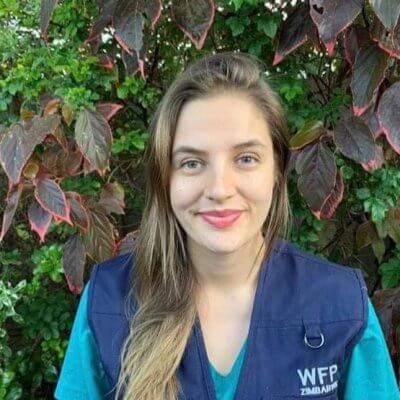Elizabeth VanVeen always finds herself thinking about one thing: the clear-cut and inescapable right to food. “While the factors that contribute to food insecurity are multi-faceted and complex, the need for food is not,” she says. “The right to food is non-negotiable. Food is a language that’s immediately understood.”
VanVeen works for The World Food Programme (WFP), the food assistance branch of the United Nations in Zimbabwe. She was initially hired as a junior professional consultant as part of an internship with the donor relations, communications and report unit. Since then, she’s worked for the Lean Season Assistance (LSA) Programme in the information management and reports office and, most recently, as a programme policy officer.

“The LSA Programme offers unconditional food assistance to the most food insecure and vulnerable households living in rural areas during peak hunger periods,” she explains. “Children under the age of two, as well as pregnant and lactating women, are given a preventative ration of specialized nutritious food. Additionally, LSA uses its beneficiary reach and food distributions as a platform to provide livelihood-related complementary activities that help build resilience during future lean seasons.”
After completing two bachelor’s degrees (a bachelor of arts and a bachelor of education) at Redeemer, VanVeen didn’t immediately know what her ideal career would look like. She now sees that food security was a prevalent theme throughout her earlier work experiences.
“While I was doing my teacher placement in Hamilton, one of the teachers I worked with brought snacks to her class so the kids could access the energy they needed to learn,” she reflects. “After university, I began teaching internationally and spent five years in Honduras, Kazakhstan and Bosnia and Herzegovina. During this time, the connection between food and cognitive functioning moved beyond theoretical to reality.”
Despite her successful trajectory as a teacher, VanVeen itched for a change. While teaching Advanced Placement (AP) Literature and Language in Bosnia and Herzegovina, she volunteered at the War Childhood Museum and eventually became a full-time staff member.
“While I was working there, I felt drawn to a collection of food assistance packages from the Bosnian War. It impressed upon me how intimate, important and life-changing food is. Around the same time, a friend showed me a call for junior professional consultants through the United Nations Association of Canada, and one of the posts was at WFP Zimbabwe. I applied and moved there in February 2019.”
In October 2020, The World Food Programme was awarded The Nobel Peace Prize in recognition, according to the official press release, of “its efforts to combat hunger, for its contribution to bettering conditions for peace in conflict-affected areas and for acting as a driving force in efforts to prevent the use of hunger as a weapon of war and conflict.” VanVeen has nothing but optimism for how this will impact the organization long term.
My education degree from Redeemer and the accompanying teaching experience gave me the skills needed to communicate with stakeholders and manage multiple projects.
“Some 690 million people go to bed hungry every day. Last year, WFP reached 114 million people with food assistance, 3.7 million of which were reached by the LSA programme. This award shines a light not only on how much has been done but on how much more still needs to be done. Food is a powerful tool that WFP uses to change the world into a more peaceful place.”
When she looks back on her time at Redeemer, VanVeen feels that she was equipped both professionally and personally for her role at WFP.
“My education degree from Redeemer and the accompanying teaching experience gave me the skills needed to communicate with stakeholders and manage multiple projects. I also learned to live my life with intention and gratefulness while working to the best of my ability. Because of this, I’ve felt peace about every career decision I’ve made.”